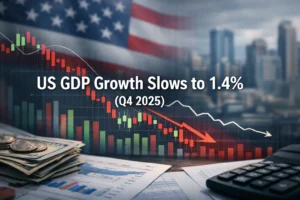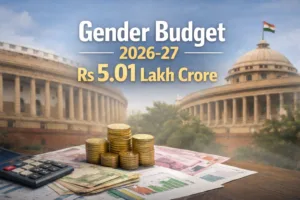Moody’s Investors Service changed the outlook on the United States’ AAA credit rating from stable to negative on 10th November 2023, signaling growing concerns about the nation’s financial stability. This move by one of the world’s leading credit rating agencies highlights several key issues that the U.S. faces, and the potential consequences are substantial.
Factors Leading to the Downgrade:
1. Rising Budget Deficit: Moody’s pointed to the alarming increase in the U.S. budget deficit, projected to reach $1.2 trillion in 2023. This surge in deficit spending poses a significant risk to the country’s fiscal health.
2. Mounting Debt Burden: The U.S. now carries a debt burden equivalent to 120% of its Gross Domestic Product (GDP). Such high debt levels can lead to increased interest payments, further exacerbating the deficit and potentially crowding out crucial government expenditures.
3. Recession Risk: The looming possibility of a recession is a major concern. A recession would strain the government’s finances even further, reducing tax revenues and increasing the demand for social safety net programs.
4. Political Polarization: Moody’s highlighted the growing polarization within the U.S. political system, which is hampering the government’s ability to address economic challenges effectively. This political gridlock could lead to inaction on key economic issues, exacerbating the problems at hand.
Consequences of the Downgrade:
1. Increased Borrowing Costs: A downgrade can make it more expensive for the U.S. government to borrow money. This could lead to higher interest rates on government bonds, potentially increasing the cost of servicing the national debt.
2. Higher Interest Rates for Businesses and Consumers: As government bond yields rise, it can have a domino effect on interest rates throughout the economy. This means that businesses and consumers may face higher borrowing costs, affecting investments, mortgage rates, and consumer spending.
3. Economic Uncertainty: A negative outlook can contribute to economic uncertainty, as it signals a potential decline in the nation’s financial strength. This may impact investor confidence and decisions, potentially affecting financial markets.
Government Response:
The U.S. government has expressed its commitment to addressing the issues raised by Moody’s. However, the ability to implement effective solutions remains uncertain due to the ongoing political polarization. The government’s success in managing its fiscal challenges will depend on its ability to reach bipartisan agreements on fiscal policy and tackle the budget deficit and debt burden effectively.
In conclusion, Moody’s downgrade of the United States’ credit rating outlook to negative underscores the pressing need for policymakers to address the nation’s fiscal challenges. The consequences of inaction could lead to higher costs of borrowing, increased interest rates, and economic uncertainty, impacting businesses and consumers alike. The nation’s ability to navigate these challenges hinges on its ability to overcome political gridlock and implement effective fiscal policies.
Disclaimer
The content provided is for informational purposes only and does not constitute financial, legal, or professional advice. Readers are encouraged to seek appropriate guidance and conduct their own research before making any decisions based on the information provided.

BBW News Desk is the editorial team of BigBreakingWire, a digital newsroom focused on global finance, markets, geopolitics, trade policy, and macroeconomic developments.
Our editors monitor government decisions, central bank actions, international trade movements, corporate activity, and economic indicators to deliver fast, fact-based reporting for investors, professionals, and informed readers.
The BBW News Desk operates under the editorial standards of BigBreakingWire, prioritizing accuracy, verified information, and timely updates on major global developments.


















Be First to Comment